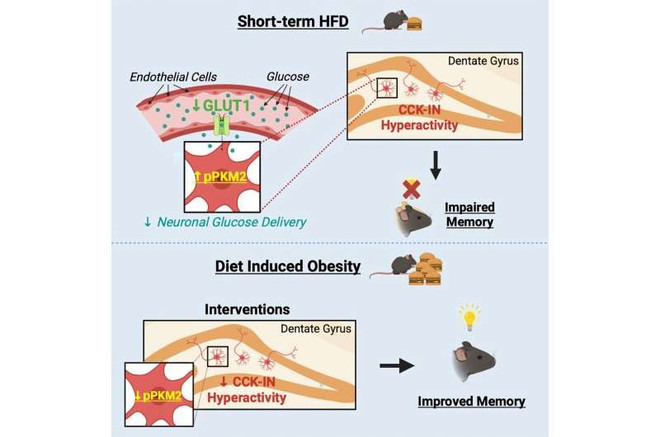We often think that the harmful effects of fast food only appear after many months or years, but new research by American scientists shows that the brain can be affected immediately after we consume foods with too much saturated fat.
A new study from the UNC School of Medicine (USA), just published in the journal Neuron, revealed the worrying effects of a diet high in saturated fat junk foods such as french fries, fried chicken... In just a few days, the neural circuits related to memory showed signs of disorder.
This finding opens up opportunities for early interventions to prevent cognitive decline and neurodegenerative diseases associated with obesity.
Led by Dr. Juan Song, Professor of Pharmacology, and Dr. Taylor Landry, lead author of the study, scientists discovered that a special group of brain cells in the hippocampus, called CCK interneurons, became overactive after eating a high-fat diet (HFD) - such as hot dogs, fried chicken, cheeseburgers, french fries... due to the brain's ability to receive glucose (sugar) being impaired.

This overactivity disrupts the hippocampus’ memory processing. What’s worrying is that this disruption happens quickly: after just a few days of eating a high-saturated fat diet, the hippocampus begins to malfunction.
The study also identified a protein called PKM2, which controls how cells use energy, as playing a key role in this process.
“We already knew that diet and metabolism affect the brain, but it was surprising to see how vulnerable a specific group of cells was,” said Dr. Song. “Even a short-term reduction in brain glucose was enough to impair memory.”
Scientists say the study showed that mice were fed a high-fat diet simulating fast food before behavioral tests. After just four days, CCK neurons in the mice’s hippocampus were found to be abnormally active.
The disturbances occur before weight gain or diabetes develops, suggesting that the brain responds almost immediately to diet. This highlights the brain’s sensitivity to nutrition.
According to the research team, a diet high in saturated fat may increase the risk of dementia and Alzheimer's in the long term.

Fortunately, the brain has the ability to “recover.” When glucose levels are restored, excessive neuronal activity is regulated, and memory improves. This suggests that early interventions—from dietary changes to pharmacological approaches—may help protect the brain from obesity-related neurodegeneration.
Notably, the team found that simply intermittent fasting after a period of high-fat eating can help rebalance CCK neuron activity and improve memory.
“The results suggest that what we eat can impact the brain almost immediately,” Dr. Song emphasized. “Strategies such as periodic fasting or pharmacological interventions could become effective ways to protect memory and reduce the risk of long-term cognitive disorders.”
Looking further ahead, the research holds out hope of reducing the growing burden of Alzheimer's disease and other metabolic-related dementias.
The team is continuing to investigate how glucose-sensitive neurons disrupt “memory rhythms,” and is testing potential therapies in humans.
In addition to medication, lifestyle changes - such as a diet that helps stabilize glucose in the brain - will also be tested to assess their brain-protective effects./.
Source: https://www.vietnamplus.vn/thoi-quen-an-fast-food-co-the-nhanh-chong-khien-nao-bo-xuong-cap-post1067671.vnp
















































































































Comment (0)